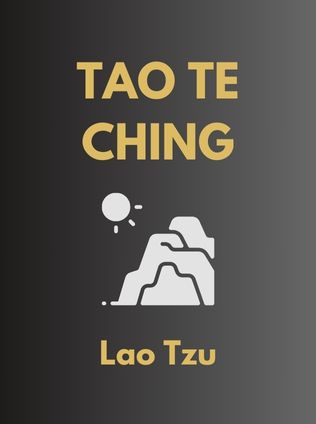
About the Author
The Tao Te Ching is one of the most profound and influential works in Chinese philosophy, attributed to the ancient sage Laozi. Although little is known about Laozi's life, he is traditionally considered a contemporary of Confucius and is believed to have lived in the 6th century BCE. According to legend, Laozi worked as a royal historian in the Zhou dynasty court. Disillusioned by the corruption and chaos around him, he decided to leave the civilized world and retreat into nature. On his way out of the kingdom, a gatekeeper recognized him and asked Laozi to write down his wisdom before departing. This resulted in the creation of the Tao Te Ching, a text that distills the essence of Taoist thought into just over 80 brief, poetic chapters.
The Tao Te Ching is more than just a philosophical text; it is a guide to living in harmony with the natural order of the universe, known as the Tao. Laozi's teachings emphasize humility, simplicity, and the wisdom of non-action (wu wei), which have had a lasting impact on Chinese culture and beyond, influencing various spiritual traditions and modern philosophical thought.
Main Idea
The Tao Te Ching is a work that explores the concept of the Tao, often translated as "The Way." The Tao represents the fundamental nature of the universe, the source and pattern of all that exists. It is beyond human comprehension and cannot be fully described, only experienced. The Tao Te Ching encourages us to align ourselves with this natural order, to embrace simplicity, humility, and to act without force or ambition. By doing so, we live in harmony with the Tao and experience true contentment and fulfillment.
The text also delves into the nature of leadership, suggesting that the best leaders are those who lead by example, not by force. Laozi teaches that by cultivating self-awareness and understanding the interconnectedness of all things, we can live peacefully and influence others positively without imposing our will upon them.
Table of Contents
- The Nature of the Tao
- Objectivity and Balance
- Non-Action (Wu Wei)
- Harmonious Living
- Leadership and Governance
The Nature of the Tao
The Tao is the central concept in the Tao Te Ching, representing the ultimate source of all existence. It is described as the "Great Mother" who nurtures and sustains all beings without discrimination. The Tao is eternal, infinite, and beyond human understanding. It is the force that creates and sustains the universe, yet it does so without effort or intention.
"The Tao that can be told is not the eternal Tao; the name that can be named is not the eternal name." - Laozi
This opening line of the Tao Te Ching highlights the ineffable nature of the Tao. It cannot be fully grasped by the human mind or expressed in words. Instead, we can only align ourselves with it through experience and intuition. The Tao is the natural order, the way things are meant to be. When we align ourselves with it, we find peace and contentment. When we go against it, we encounter struggle and suffering.
Embracing the Unknowable
One of the key teachings of the Tao Te Ching is the idea of embracing the unknowable. Laozi encourages us to let go of our desire to control or fully understand the world around us. Instead, we should accept the mystery of the Tao and trust in its wisdom. This requires humility and a willingness to surrender our ego-driven desires.
Sign up for FREE and get access to 1,400+ books summaries.
You May Also Like
The Subtle Art of Not Giving a F*ck
A Counterintuitive Approach to Living a Good Life
By Mark MansonRich Dad Poor Dad
What the Rich Teach Their Kids About Money - That the Poor and Middle Class Do Not!
By Robert T. KiyosakiHow To Win Friends and Influence People
The All-Time Classic Manual Of People Skills
By Dale Carnegie



















